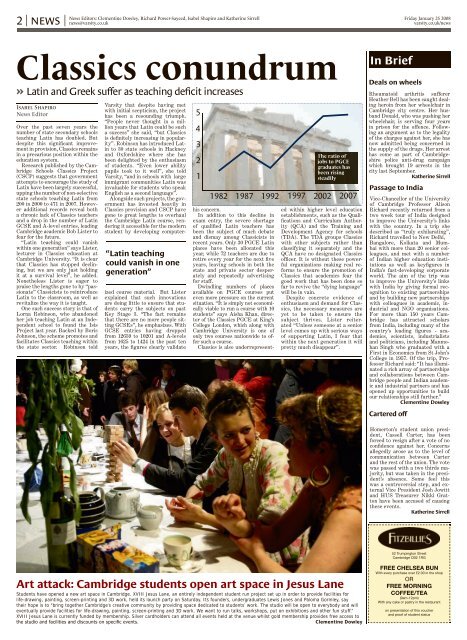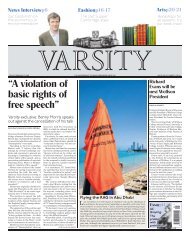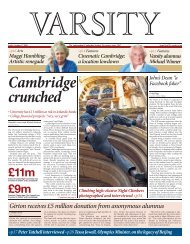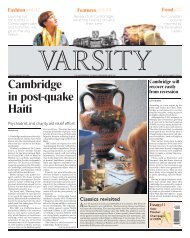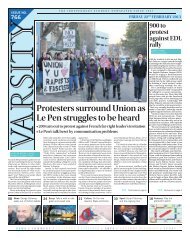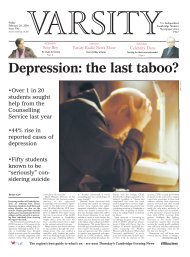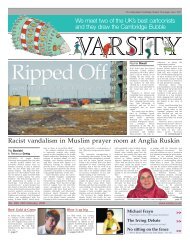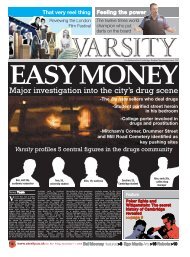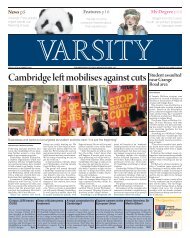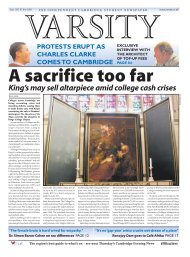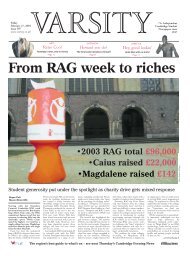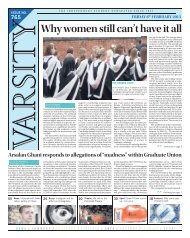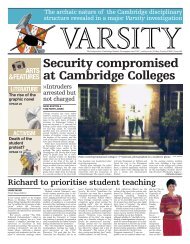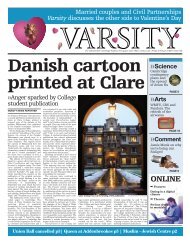Food & Drink Face Off Interview - Varsity
Food & Drink Face Off Interview - Varsity
Food & Drink Face Off Interview - Varsity
You also want an ePaper? Increase the reach of your titles
YUMPU automatically turns print PDFs into web optimized ePapers that Google loves.
2 NEWS<br />
News Editors: Clementine Dowley, Richard Power-Sayeed, Isabel Shapiro and Katherine Sirrell<br />
news@varsity.co.uk<br />
Friday January 25 2008<br />
varsity.co.uk/news<br />
Classics conundrum<br />
» Latin and Greek suffer as teaching deficit increases<br />
Isabel Shapiro<br />
News Editor<br />
Over the past seven years the<br />
number of state secondary schools<br />
teaching Latin has doubled. But<br />
despite this significant improvement<br />
in provision, Classics remains<br />
in a precarious position within the<br />
education system.<br />
Research published by the Cambridge<br />
Schools Classics Project<br />
(CSCP) suggests that government<br />
attempts to encourage the study of<br />
Latin have been largely successful,<br />
upping the number of non-selective<br />
state schools teaching Latin from<br />
200 in 2000 to 471 in 2007. However<br />
additional records reveal both<br />
a chronic lack of Classics teachers<br />
and a drop in the number of Latin<br />
GCSE and A-level entries, leading<br />
Cambridge academic Bob Lister to<br />
fear for the future.<br />
“Latin teaching could vanish<br />
within one generation” says Lister,<br />
lecturer in Classics education at<br />
Cambridge University. “It is clear<br />
that Classics has stopped declining,<br />
but we are only just holding<br />
it at a survival level”, he added.<br />
Nonetheless Lister is eager to<br />
praise the lengths gone to by “passionate”<br />
Classicists to reintroduce<br />
Latin to the classroom, as well as<br />
revitalize the way it is taught.<br />
One such success story is that of<br />
Lorna Robinson, who abandoned<br />
her job teaching Latin at an Independent<br />
school to found the Isis<br />
Project last year. Backed by Boris<br />
Johnson, the scheme promotes and<br />
facilitates Classics teaching within<br />
the state sector. Robinson told<br />
“Latin teaching<br />
could vanish in one<br />
generation”<br />
<strong>Varsity</strong> that despite having met<br />
with initial scepticism, the project<br />
has been a resounding triumph.<br />
“People never thought in a million<br />
years that Latin could be such<br />
a success” she said, “but Classics<br />
is definitely increasing in popularity”.<br />
Robinson has introduced Latin<br />
to 30 state schools in Hackney<br />
and Oxfordshire where she has<br />
been delighted by the enthusiasm<br />
of students. “Even lower ability<br />
pupils took to it well”, she told<br />
<strong>Varsity</strong>, “and in schools with large<br />
immigrant communities Latin was<br />
invaluable for students who speak<br />
English as a second language”.<br />
Alongside such projects, the government<br />
has invested heavily in<br />
Classics provision and CSCP have<br />
gone to great lengths to overhaul<br />
the Cambridge Latin course, rendering<br />
it accessible for the modern<br />
student by developing computerized<br />
course material. But Lister<br />
explained that such innovations<br />
are doing little to ensure that students<br />
carry the subjects on past<br />
Key Stage 3. “The fact remains<br />
that there are no more people sitting<br />
GCSEs”, he emphasizes. With<br />
GCSE entries having dropped<br />
from 12659 to 10201 and A-levels<br />
from 1625 to 1424 in the past ten<br />
years, the figures clearly validate<br />
5<br />
4<br />
3<br />
2<br />
1<br />
The ratio of<br />
jobs to PGCE<br />
graduates has<br />
been rising<br />
steadily<br />
1982 1987 1992 1997 2002 2007<br />
his concern.<br />
In addition to this decline in<br />
exam entry, the severe shortage<br />
of qualified Latin teachers has<br />
been the subject of much debate<br />
and dismay among Classicists in<br />
recent years. Only 30 PGCE Latin<br />
places have been allocated this<br />
year, while 72 teachers are due to<br />
retire every year for the next five<br />
years, leaving schools in both the<br />
state and private sector desperately<br />
and repeatedly advertising<br />
for staff.<br />
Dwindling numbers of places<br />
available on PGCE courses put<br />
even more pressure on the current<br />
situation. “It is simply not economically<br />
viable to run a course with 10<br />
students” says Aisha Khan, director<br />
of the Classics PGCE at King’s<br />
College London, which along with<br />
Cambridge University is one of<br />
only two courses nationwide to offer<br />
such a course.<br />
Classics is also underrepresented<br />
within higher level education<br />
establishments, such as the Qualifications<br />
and Curriculum Authority<br />
(QCA) and the Training and<br />
Development Agency for schools<br />
(TDA). The TDA groups Classics<br />
with other subjects rather than<br />
classifying it separately and the<br />
QCA have no designated Classics<br />
officer. It is without these powerful<br />
organizations making real reforms<br />
to ensure the promotion of<br />
Classics that academics fear the<br />
good work that has been done so<br />
far to revive the “dying language”<br />
will be in vain.<br />
Despite concrete evidence of<br />
enthusiasm and demand for Classics,<br />
the necessary measures are<br />
yet to be taken to ensure the<br />
subject thrives. Lister reiterated<br />
“Unless someone at a senior<br />
level comes up with serious ways<br />
of supporting Latin, I fear that<br />
within the next generation it will<br />
pretty much disappear”.<br />
In Brief<br />
Deals on wheels<br />
Rheumatoid arthritis sufferer<br />
Heather Bell has been caught dealing<br />
heroin from her wheelchair in<br />
Cambridge city centre. Her husband<br />
Donald, who was pushing her<br />
wheelchair, is serving four years<br />
in prison for the offence. Following<br />
an argument as to the legality<br />
of the charges against her, she has<br />
now admitted being concerned in<br />
the supply of the drugs. Her arrest<br />
has come as part of Cambridgeshire<br />
police anti-drug campaign<br />
which brought 19 arrests in the<br />
city last September.<br />
Katherine Sirrell<br />
Passage to India<br />
Vice-Chancellor of the University<br />
of Cambridge Professor Alison<br />
Richard recently returned from a<br />
two week tour of India designed<br />
to improve the University’s links<br />
with the country. In a trip she<br />
described as “truly exhilarating”,<br />
Richard travelled to New Delhi,<br />
Bangalore, Kolkata and Mumbai<br />
with more than 20 senior colleagues,<br />
and met with a number<br />
of Indian higher education institutions<br />
as well as keyfigures in<br />
India’s fast-developing corporate<br />
world. The aim of the trip was<br />
to improve the University’s links<br />
with India by giving formal recognition<br />
to existing partnerships<br />
and by building new partnerships<br />
with colleagues in academic, industrial<br />
and NGO organisations.<br />
For more than 150 years Cambridge<br />
has attracted scholars<br />
from India, including many of the<br />
country’s leading figures - academics,<br />
scientists, industrialists<br />
and politicians, including Manmohan<br />
Singh who graduated with a<br />
First in Economics from St John’s<br />
College in 1957. Of the trip, Professor<br />
Richard said: “It has illuminated<br />
a rich array of partnerships<br />
and collaborations between Cambridge<br />
people and Indian academic<br />
and industrial partners and has<br />
opened up opportunities to build<br />
our relationships still further.”<br />
Clementine Dowley<br />
Cartered off<br />
Homerton’s student union president,<br />
Cassell Carter, has been<br />
forced to resign after a vote of no<br />
confidence against her. Concerns<br />
allegedly arose as to the level of<br />
communication between Carter<br />
and the rest of the union. The vote<br />
was passed with a two thirds majority,<br />
but was taken in the president’s<br />
absence. Some feel this<br />
was a controversial step, and external<br />
Vice President Josh Jowitt<br />
and HUS Treasurer Nikki Gratton<br />
have been accused of causing<br />
these events.<br />
Katherine Sirrell<br />
52 Trumpington Street<br />
Cambridge CB2 1RG<br />
Art attack: Cambridge students open art space in Jesus Lane<br />
Students have opened a new art space in Cambridge. XVIII Jesus Lane, an entirely independent student run project set up in order to provide facilities for<br />
life-drawing, painting, screen-printing and 3D work, held its launch party on Saturday. Its founders, undergraduates Lewis Jones and Paloma Gormley, say<br />
their hope is to “bring together Cambridge’s creative community by providing space dedicated to students’ work. The studio will be open to everybody and will<br />
eventually provide facilities for life-drawing, painting, screen-printing and 3D work. We want to run talks, workshops, put on exhibitions and other fun stuff.”<br />
XVIII Jesus Lane is currently funded by membership. Silver cardholders can attend all events held at the venue whilst gold membership provides free access to<br />
the studio and facilities and discounts on specific events.<br />
Clementine Dowley<br />
FREE CHELSEA BUN<br />
With every purchase over £2.00 in the shop<br />
OR<br />
FREE MORNING<br />
COFFEE/TEA<br />
(9am-12pm)<br />
With any cake or pastry in the restaurant<br />
on presentation of this voucher<br />
and proof of student status


